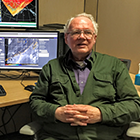
I work in the AAWU making graphical and text forecasts of icing, turbulence, surface winds, convection, ceilings, and visibility for the entire state of AK and surrounding ocean waters. I produce Airman's Meteorological Information (AIRMETs) and Significant Meteorological Information (SIGMETs) to warn of especially dangerous flying conditions. I also produce Volcanic Ash Advisories (VAAs) and associated SIGMETs warning of the presence of volcanic ash over our area of responsibility.
The 'Shutdown Blizzard' of October 2013, called that because it happened during the federal government shutdown and because it totally shut down Rapid City. I worked forecaster training shifts that week, doing an extended forecast on Monday that included the potential for the storm. I relieved one of the other forecasters so he could concentrate on the storm during the following days; our forecasts were excellent. From 7am Friday to 1pm on Sunday, I was snowed in at the office and issued forecasts and warnings.
My early fascination with meteorology and weather forecasting, starting in 8th grade led to my being mentored through a high school science program by an outstanding forecaster among many then at the Cleveland Weather Bureau office, John McClain. My excitement about meteorology was fed and nurtured by a teaching-oriented faculty at the University of Wisconsin, including Reid Bryson and Lyle Horn. Later, my interest in daily weather fed my spirit even while away from meteorology. To work for the federal government is an honor I cherish.